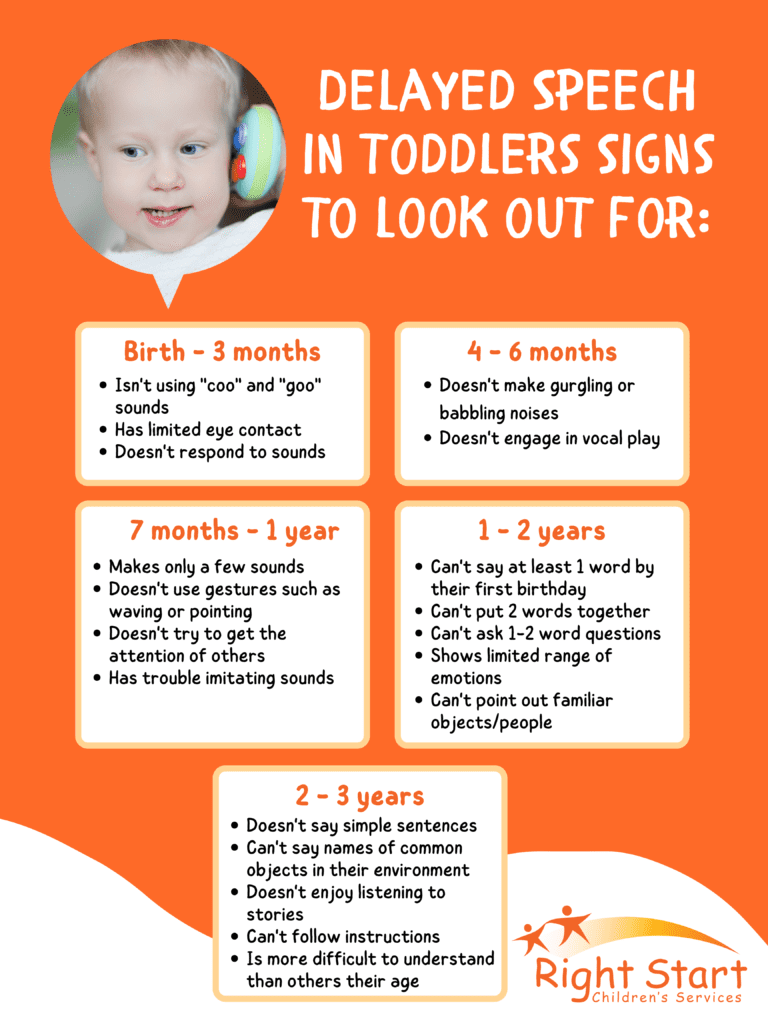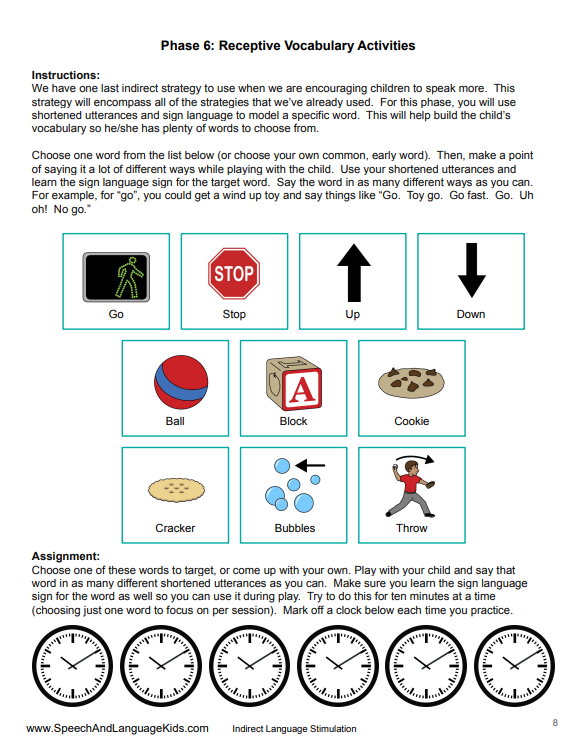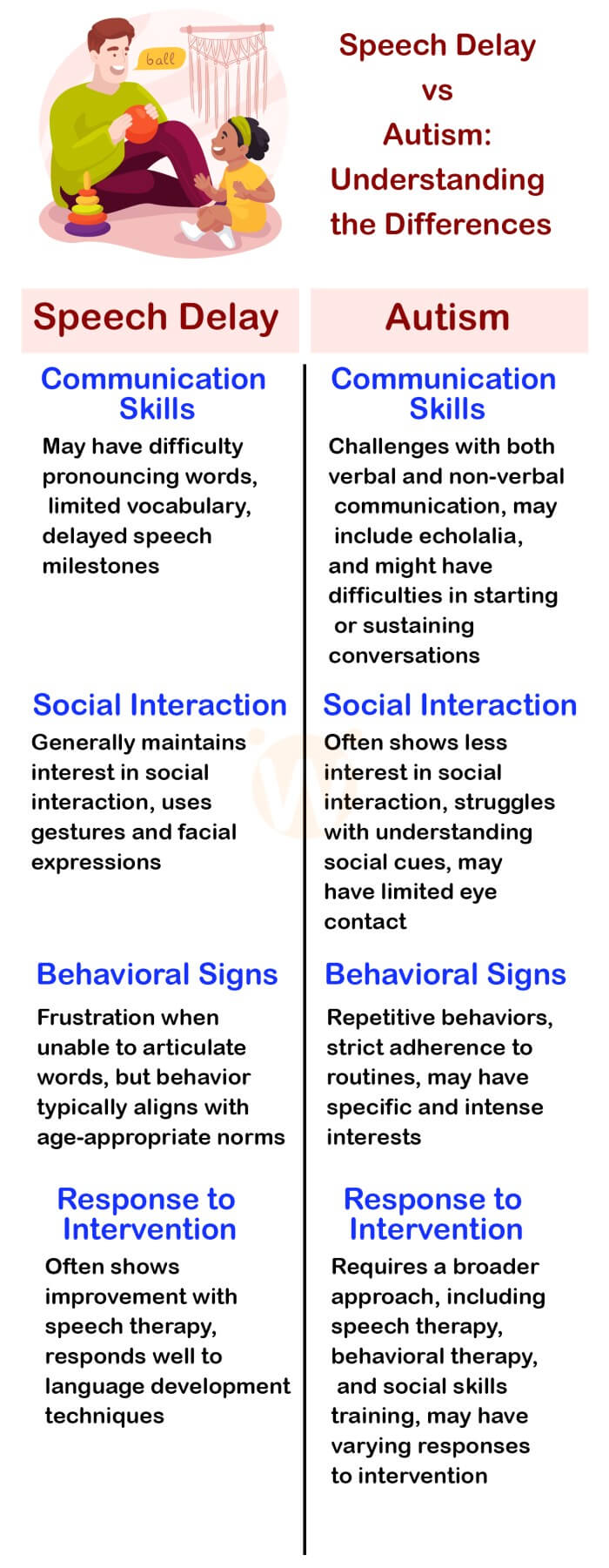Imagine the joy of watching your child take their first steps. Now, think about the anticipation of hearing their first words.
But what if those words are delayed? You’re not alone. Many parents face speech delays with their children, and it can be both challenging and worrying. You might be asking yourself: “Is there something I can do to help? ” The answer is yes, and understanding how to support your child can make all the difference.
This guide is here to offer you practical strategies and insights to help your child find their voice. Let’s explore how you can take positive steps to assist your child’s speech development.

Credit: www.rightstartservices.com
Recognizing Speech Delay
Identifying speech delay early helps in providing effective support. Simple activities, like reading aloud, can improve language skills. Encourage conversations and play to boost vocabulary and confidence in communication.
Recognizing speech delay early can be pivotal in supporting your child’s communication skills. Understanding how to identify these delays allows you to take proactive steps in helping your child overcome them. Many parents face this challenge, and knowing what to look for can make all the difference.
Common Signs And Symptoms
Speech delay manifests in various ways, and recognizing these signs is the first step toward addressing them. Does your child struggle to form words or sentences appropriate for their age? You might notice that they use fewer words than peers or have difficulty pronouncing sounds clearly. Some children might show frustration when trying to communicate. This can be due to their inability to express themselves effectively. If your child is less responsive to verbal cues or avoids social interactions, it could be another indicator of speech delay. Observing these signs doesn’t mean you should panic. Every child develops at their own pace, but these symptoms should prompt you to seek guidance from professionals if they persist.
Age-appropriate Milestones
Knowing what milestones your child should reach can provide clarity on whether they have a speech delay. At 12 months, most children begin using simple words like “mama” and “dada.” By age two, they typically start forming two-word phrases like “more juice.” Consider how your child communicates. Are they able to follow simple directions or point to objects when named? These are milestones that help assess their speech development. Reflect on your child’s progress compared to these benchmarks. If they consistently lag behind, it might be time to explore further support options. Recognizing these milestones not only guides you but empowers you to make informed decisions about your child’s speech development journey. How do you feel about your child’s speech development? Are there areas where you see room for improvement? Understanding these aspects can help you engage more effectively with therapists and educators.
Consulting Professionals
When your child experiences speech delay, it can be challenging and worrisome. Consulting professionals is often a crucial step to understanding the root of the issue and finding effective solutions. This approach not only provides expert insights but also gives you peace of mind knowing that you are taking the necessary steps to support your child’s development. Let’s delve into when you should seek expert advice and how to find the right specialist for your child.
When To Seek Expert Advice
Every child develops at their own pace, making it difficult to pinpoint the right time to seek professional help. However, if your child is consistently falling behind developmental milestones or struggling to communicate basic needs, it might be time to consult a specialist.
Trust your instincts as a parent. If you feel something is off, don’t hesitate to reach out. Early intervention can make a significant difference in your child’s speech development.
Consider the impact on everyday activities. Is your child frustrated or withdrawn due to communication barriers? These signs may indicate that professional guidance is needed.
Finding The Right Specialist
Choosing the right specialist can make a world of difference. Start by asking your pediatrician for recommendations. They often have connections with trusted speech therapists.
Research local options. Look for professionals who specialize in speech delays and have experience working with children similar to yours.
Don’t be afraid to ask questions. Inquire about their approach, experience, and success stories. A good specialist will be open and transparent, making you feel comfortable and supported.
Remember, this is your child’s journey. Engage with the process, and ensure the specialist aligns with your family’s needs and values.
Have you considered seeking advice from professionals before? What are your concerns or hesitations? Share your thoughts and join the conversation.
Speech Therapy Techniques
Speech therapy techniques can be incredibly effective in helping children with speech delays. These methods are designed to cater to the child’s unique needs, making communication easier and more enjoyable. Whether you’re a parent or a caregiver, understanding these techniques can empower you to support your child’s speech development journey.
Interactive Exercises
Interactive exercises are a cornerstone of effective speech therapy. These activities engage your child in fun and meaningful ways, encouraging them to practice sounds and words. You can use games like ‘Simon Says’ to help your child mimic sounds or words in a playful setting. Picture cards can also be used to create a matching game that prompts your child to say the names of objects aloud.
Think about the last time you played a simple game with your child. Did you notice how they were eager to participate? Harness that enthusiasm with exercises that involve repeating sounds, singing songs, or storytelling. These activities help build a strong foundation for language skills.
Role Of Play In Speech Development
Play is not just about fun; it’s an essential part of speech development. Through play, children explore new sounds and words in a stress-free environment. Toys that encourage vocalization, like talking dolls or musical instruments, can be great tools. They prompt your child to make sounds and express themselves without pressure.
Imagine your child talking to their favorite toy. They might be saying simple words or engaging in pretend conversations. This playful interaction is crucial because it naturally encourages communication. By integrating play into everyday routines, you create numerous opportunities for your child to practice speech.
How can you make speech therapy more engaging for your child? Consider turning everyday moments into learning opportunities. When cooking, talk about the ingredients and their colors. During a walk, name the objects you see. Each interaction is a chance to strengthen your child’s language skills.
Speech therapy techniques are about creating a nurturing environment where your child feels comfortable and excited to learn. With interactive exercises and play, you have powerful tools to support your child’s speech development.

Credit: www.speechandlanguagekids.com
Home-based Interventions
Speech delay in children can be concerning for many parents. Home-based interventions offer a nurturing environment to support language development. These strategies can easily be integrated into daily routines, enhancing a child’s communication skills. Let’s explore effective methods for creating a supportive atmosphere for your child.
Creating A Language-rich Environment
Fill your home with opportunities for communication. Surround your child with books, pictures, and toys that encourage talking. Label items around the house to boost vocabulary. Use colorful charts and flashcards to make learning fun. Turn everyday activities into learning moments. Describe actions and name objects during playtime. This helps children connect words with meanings naturally.
Daily Communication Practices
Engage in conversations with your child every day. Ask open-ended questions to encourage responses. Listen patiently and give them time to express themselves. Repeat and expand their words to model correct speech. Narrate daily routines like cooking or cleaning. Sing songs and rhymes to build language rhythm. Use gestures and facial expressions to support understanding. Consistent practice fosters confidence and growth in speech abilities.
Incorporating Technology
In today’s digital age, technology offers amazing resources to support children with speech delays. With the right tools, you can make speech development both fun and effective. Technology can be a powerful ally in your journey, providing interactive and engaging ways to help your child improve their speech skills. But how do you harness this power without letting screens take over your lives?
Apps And Tools For Speech Development
There are numerous apps designed specifically for speech development. These apps use games and interactive activities to make learning enjoyable. One such app is Speech Blubs, which uses voice-activated games to encourage your child to speak more.
Another valuable tool is Articulation Station. It offers exercises that focus on specific sounds, helping children practice the pronunciation they struggle with. With these apps, children can learn at their own pace, making progress in a way that feels like play.
Have you tried using these apps with your child? What was the outcome? Engaging them through technology might just be the spark they need.
Balancing Screen Time
While technology is a great resource, it’s crucial to balance screen time with other activities. You don’t want your child glued to a screen all day, even if it’s educational. Set clear limits on how much time is spent on these apps daily.
Encourage offline activities that complement speech development, like reading aloud or playing word games. These can provide a break from screens while still promoting speech skills. What offline activities does your child enjoy?
By maintaining a balance, you ensure that technology enhances speech development without overshadowing other important learning experiences. Are you ready to try this balanced approach with your child?
Parental Involvement
Parents play a key role in supporting children with speech delay. Engage in daily conversations and read simple books together. Encourage speech through playful activities, fostering a supportive environment for language development.
Parental involvement is a key element in supporting a child with speech delay. Your active participation can make a real difference in how your child communicates and connects with the world. By engaging in your child’s speech development journey, you not only help them improve their skills but also strengthen your bond with them. This involvement can transform a challenging situation into a rewarding experience for both you and your child.
Building Confidence And Motivation
Your child looks up to you for encouragement. Simple words of praise can boost their confidence significantly. When they attempt a new word or phrase, celebrate that effort. Create a supportive environment at home. Use positive reinforcement to motivate them. If your child says “dog” instead of “doggy,” acknowledge their effort with a smile or a hug. Consider setting small, achievable goals. This approach helps maintain their interest and keeps them motivated. If your child loves a particular toy, use it as a tool to encourage speech by describing it together.
Tracking Progress And Celebrating Milestones
Keep a journal to track your child’s progress. Note down new words, phrases, or sounds they learn. This will help you see patterns and recognize what methods work best. Share these milestones with your child. Let them know how far they’ve come. You could mark these achievements on a calendar or create a progress chart. Involve other family members in celebrating these milestones. It could be as simple as a family dinner or a small gift. This recognition not only makes your child feel special but also motivates them to keep trying. Ask yourself: what small steps can you take today to support your child’s speech journey? Your involvement is not just about teaching words; it’s about nurturing growth and confidence.
Community Resources
Helping a child with speech delay can feel overwhelming. Community resources can provide crucial support. They offer practical tools and emotional assistance. Many organizations provide valuable resources for families. These resources include support groups, workshops, and educational services. They aim to empower parents and children alike.
Support Groups And Workshops
Support groups offer a safe space for parents. Here, they can share experiences and learn from others. Many parents find comfort in knowing they are not alone. These groups often meet regularly and provide guidance. They also offer emotional support and practical advice. Workshops, on the other hand, focus on specific skills. They might teach communication techniques or other strategies. Parents can learn how to better assist their child. Workshops often feature experts in speech development. They provide insights that can be applied at home.
Navigating Educational Services
Understanding educational services is vital for speech delay support. Schools often offer specialized programs for children with speech challenges. These programs are designed to meet individual needs. Parents should inquire about available services in their local schools. Educational services may include speech therapy sessions. They also offer individualized learning plans. Engaging with these services can enhance a child’s development. Parents should work closely with educators. This ensures a consistent approach at home and school.

Credit: www.mywellnesshub.in
Frequently Asked Questions
Can You Fix Speech Delay?
Yes, speech delay can be addressed. Consult a speech therapist for personalized strategies and interventions. Early treatment often leads to better outcomes. Encourage communication through games and daily activities. Regular practice and patience are key to progress.
What Is The Cause Of Speech Delay?
Speech delay can result from hearing issues, developmental disorders, lack of stimulation, or neurological conditions. Environmental factors and bilingualism might also contribute. Early diagnosis is crucial for effective intervention. Always consult a healthcare professional for accurate assessment and guidance.
How To Help A 2 Year Old Talk?
Engage in regular conversation with your child, using simple words. Read books together daily. Encourage naming objects during play. Sing songs and nursery rhymes. Offer choices to prompt responses. Limit screen time and provide plenty of interactive play opportunities. Be patient and celebrate small progress.
When Is A Child Considered Speech Delayed?
A child is considered speech delayed if they aren’t meeting typical speech milestones for their age. For example, by age 2, they should be using simple phrases. Early intervention is crucial for addressing speech delays effectively. Always consult a pediatrician or speech therapist for an accurate assessment.
Conclusion
Supporting a child with speech delay requires patience and understanding. Consistent efforts lead to progress. Engage your child in daily conversations. Read together to boost vocabulary. Simple games can make learning fun. Consult a speech therapist for personalized advice. Early intervention often brings better results.
Celebrate small victories to encourage your child. Every child learns at their own pace. Remember, you’re not alone in this journey. Seek support from other parents or professionals. Keep nurturing your child’s communication skills. Over time, improvements will become evident.
Your dedication makes a big difference.

